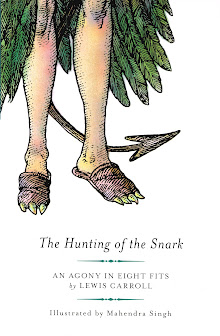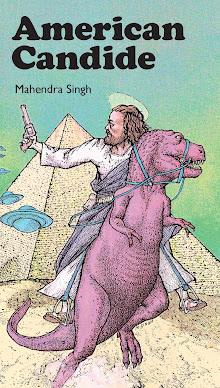
Such friends, as the Beaver and Butcher became,
Have seldom if ever been known;
In winter or summer, ‘twas always the same —
You could never meet either alone.
The attentive reader will notice that in this panel, as in the last two panels, we have been undergoing what specialists in this sort of thing call a Transition. Beginning with an ur-schoolroom redolent of the worst Boschian horrors Christ Church could have on tap, we shifted into a theatrical backdrop of sorts, then flitted through a hasty visual flashback of various preceding Fits and now find ourselves in a pastoral sort of setting, evocative of an English garden party frequented by exactly the sort of Carrollian riffraff one always finds lurking about at such affairs.
Gosh! This Transformation business is mickle hard to pull off, it’s certainly easier for the likes of poets such as Lewis Carroll to shift quarters if they wish, it’s merely a question of them upending a spare thesaurus and rummaging about with a few new adjectives and suitable prepositions. For us picture-wallahs, it’s a whole different story! The extras have to be chosen and then costumed, the appropriate locales have to be researched and then reproduced at considerable expense, then there’s lighting and makeup, why, the catering alone is an logistical boojum!
In this case, we’ve arranged for some currently unemployed peons from Alice in Wonderland to serve drinks and snacks whilst the Fellowship of the Snark mill around in period costumes with various Protosurrealist floozies glued to their arms, all of ‘em muttering rhubarb-rhubarb-custard-custard to give it all that air of Carrollian verisimilitude.
Of course, in the Good Old Days they didn’t call it a Transition, it was a Metamorphosis back then and it was all the rage in pre-Christian circles. You couldn’t go outside for the morning paper without bumping into someone’s teenaged daughter bursting into foliage or regressing into a giant spider; such goings-on were pure catnip for the poets of that time and I think it’s safe to say that the advent of monotheism put the kibosh on a considerable source of innocent merriment for both gods and mortals.
All of which brings us to the semi-belated point that in some subliminal manner, Lewis Carroll’s High Anglican penchant for Nonsense verse is really the sneaky pagan’s taste for Metamorphosis resurgent in the usually sacrosanct domain of Logic and Semiotics! As always, I’ll eschew further elaboration of this particular observation out of respect for the sausage-stuffing-phobia of any decent reader towards such crypto-Bismarckian literary goings-ons.
I shall confine myself to remarking that Metamorphosis is a fine thing, a double-plus-fine thing to liven up any bit of illustration or verse you might have handy; perhaps the Beaver and Butcher’s unexpected metamorphosis into the very best of friends is just the sort of versification needed to bring back the salad days of wine, women and Pagan Nonsense …









